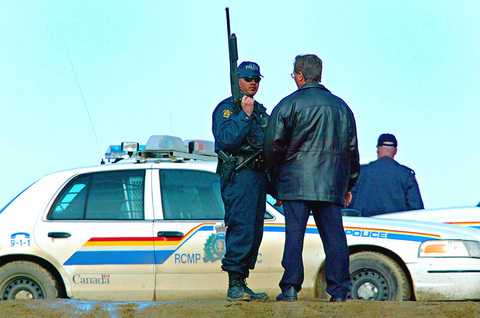The slayings of four Mounties during a raid has added new controversy to the debate about whether Canada should decriminalize the possession of small amounts of marijuana.
Canada's ruling Liberal party debated its proposed law at a policy convention in Ottawa on Saturday, two days after the deadliest attack on Canadian police officers in 120 years.
The four Royal Canadian Mounted Police officers were killed at an Alberta farm where there was a small marijuana growing operation. The slayings triggered a national debate over the Liberal's proposed law and whether it goes far enough to discourage grow operations while decriminalizing possession of small amounts of marijuana.

PHOTO: AP
Under the bill, getting caught with 15 grams -- about half an ounce -- or less of marijuana would bring a citation akin to a traffic ticket, not a criminal record.
While possession of marijuana would remain illegal, the bill is intended to prevent young people from being saddled with a lifelong criminal record.
At the same time, the maximum sentence for illegal growers would be increased to 14 years in prison from the current seven, while trafficking would remain punishable by up to life in prison.
Almost 600 Liberal convention delegates at a justice workshop endorsed nonbinding resolutions that would alter the proposed bill. They simultaneously endorsed resolutions that would see pot legalized, taxed and federally regulated -- while also voting to impose mandatory minimum sentences on convicted grow operators.
But neither resolution was debated by the full convention plenary of about 2,500 delegates, meaning neither will become official party policy this weekend.
Canadian Justice Minister Irwin Cotler also said he didn't think a minimum sentence would serve as a deterrent. On Thursday, Cotler said changes to the proposed law would be considered.
The mother of Brock Myrol, one of officers killed, urged Canada's Prime Minister to get tougher on marijuana laws.
"Prime Minister Paul Martin, we depend on you and we expect you to change the laws and give the courts real power," Colleen Myrol said outside her home in Red Deer, Alberta. "Give the power back to the police."
Tony Cannavino, president of the Canadian Professional Police Association, said the proposed legislation needs to include a two-year minimum sentence to serve as deterrent.
Garth Goodhew, a delegate at the convention, warned that the proposed law might be considered in bad taste so soon after the slayings.
"Four young Canadians were killed two days ago." Goodhew shouted.

ELECTION DISTRACTION? When attention shifted away from the fight against the militants to politics, losses and setbacks in the battlefield increased, an analyst said Recent clashes in Somalia’s semi-autonomous Jubaland region are alarming experts, exposing cracks in the country’s federal system and creating an opening for militant group al-Shabaab to gain ground. Following years of conflict, Somalia is a loose federation of five semi-autonomous member states — Puntland, Jubaland, Galmudug, Hirshabelle and South West — that maintain often fractious relations with the central government in the capital, Mogadishu. However, ahead of elections next year, Somalia has sought to assert control over its member states, which security analysts said has created gaps for al-Shabaab infiltration. Last week, two Somalian soldiers were killed in clashes between pro-government forces and

Ten cheetah cubs held in captivity since birth and destined for international wildlife trade markets have been rescued in Somaliland, a breakaway region of Somalia. They were all in stable condition despite all of them having been undernourished and limping due to being tied in captivity for months, said Laurie Marker, founder of the Cheetah Conservation Fund, which is caring for the cubs. One eight-month-old cub was unable to walk after been tied up for six months, while a five-month-old was “very malnourished [a bag of bones], with sores all over her body and full of botfly maggots which are under the

BRUSHED OFF: An ambassador to Australia previously said that Beijing does not see a reason to apologize for its naval exercises and military maneuvers in international areas China set off alarm bells in New Zealand when it dispatched powerful warships on unprecedented missions in the South Pacific without explanation, military documents showed. Beijing has spent years expanding its reach in the southern Pacific Ocean, courting island nations with new hospitals, freshly paved roads and generous offers of climate aid. However, these diplomatic efforts have increasingly been accompanied by more overt displays of military power. Three Chinese warships sailed the Tasman Sea between Australia and New Zealand in February, the first time such a task group had been sighted in those waters. “We have never seen vessels with this capability

‘NO INTEGRITY’: The chief judge expressed concern over how the sentence would be perceived given that military detention is believed to be easier than civilian prison A military court yesterday sentenced a New Zealand soldier to two years’ detention for attempting to spy for a foreign power. The soldier, whose name has been suppressed, admitted to attempted espionage, accessing a computer system for a dishonest purpose and knowingly possessing an objectionable publication. He was ordered into military detention at Burnham Military Camp near Christchurch and would be dismissed from the New Zealand Defence Force at the end of his sentence. His admission and its acceptance by the court marked the first spying conviction in New Zealand’s history. The soldier would be paid at half his previous rate until his dismissal